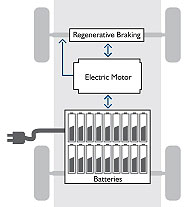A battery electric vehicle uses batteries to power an electric motor to propel the vehicle. BEVs produce no tailpipe emissions. The batteries are recharged from the grid and from regenerative braking. Types of battery electric vehicles in widespread use today include low-speed, neighborhood electric vehicles, airport ground support equipment, and off-road industrial equipment such as fork lifts.

Advantages of battery electric vehicles (BEVs):
- Zero tailpipe emissions (no CO2 or other pollutants
- Use of cleaner electric energy produced through advanced natural gas and coal gasification technologies
- Energy security by displacing imported petroleum with domestic generated electricity Overnight battery recharging (Neighborhood electric vehicles are recharged by plugging into a standard 110-volt household outlet.)
- Recycled energy from regenerative braking
- Lower fuel and operational costs
- Possible use in secondary markets for used batteries and reduced waste
Challenges:
- Improving battery technology: lower costs, increased energy density, extended durability
- Possible need for public recharging infrastructure
- Extending mileage range




